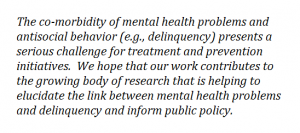Most would argue that youth violence is becoming a growing concern in today’s society. A recent study by Jennifer Wareham and Denise Paquette, published in the Criminal Justice and Behavior Journal, explored whether or not youth are just being defiant, or if they also may suffer from some sort of mental health problem.
Wareham and Paquette hypothesized that mental health problems, those listed in the Diagnostic and Statistical Manual of Mental Disorders (DSM), would be linked to violence frequency among adolescents.  Wareham indicated, “The co-morbidity of mental health problems and antisocial behavior (e.g., delinquency) presents a serious challenge for treatment and prevention initiatives. We hope that our work contributes to the growing body of research that is helping to elucidate the link between mental health problems and delinquency and inform public policy.” They also hypothesized that mental health problems would intensify the effects of other risks on violent behavior.
Wareham indicated, “The co-morbidity of mental health problems and antisocial behavior (e.g., delinquency) presents a serious challenge for treatment and prevention initiatives. We hope that our work contributes to the growing body of research that is helping to elucidate the link between mental health problems and delinquency and inform public policy.” They also hypothesized that mental health problems would intensify the effects of other risks on violent behavior.
Wareham and Paquette did find that mental health problems were associated with violence in adolescents. Wareham states, “This effect remains significant even when controlling for a variety of individual demographic characteristics, prior violent offending, peer problems, family problems, and neighborhood conditions.” With this link, it is important that those teens that exhibit oppositional defiant behaviors see a professional who can help address these concerns, possibly preventing violent behaviors from becoming serious matters.
The DSM is the resource that psychologists and other mental health professionals use to help diagnose mental illnesses. Though the DSM-5 was released in May of 2013, the DSM-IV was used for this research.
It is normal and healthy for adolescents to rebel against their parents a times, but most will not complete violent acts due to wanting to be “independent.” Wareham states, “Certainly, not all youth demonstrating oppositional defiant problems will become violent, but, on average, such youth are at risk of demonstrating future violent behaviors. This means it is important to direct youths experiencing such problems to professional persons and resources to adequately address the underlying issues associated with oppositional defiance and aggressive behaviors.” Parents and other professionals should keep a close eye on this to ensure that adolescents are getting the proper help they need when dealing with mental health issues.
By KaNisha Flemming
KaNisha is a double major in Psychology and Human Development who plans on graduating in Spring of 2014. She then plans on attending graduate school to earn a Masters in Counseling and hopes to work in the prison system or with juvenile delinquents.
________________
Dr. Jennifer Wareham is an Associate Professor in the department of Criminal Justice at Wayne State University in Detroit, MI. She possesses a doctorate degree in criminology from the University of South Florida. She can be reached at jwareham@wayne.edu
Dr. Denise Paquette Boots is an Associate Professor in the program in Criminology at the University of Texas at Dallas, TX. She possesses a doctorate degree in criminology from the University of South Florida. She can be reached at deniseboots@utdallas.edu
